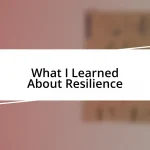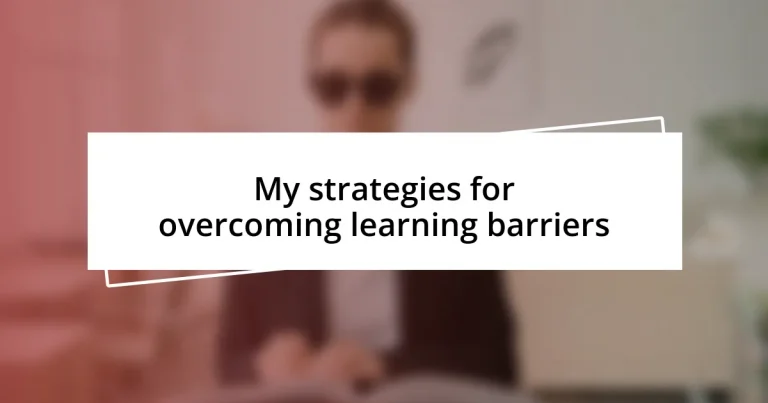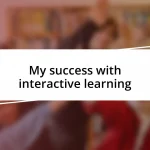Key takeaways:
- Learning barriers can stem from emotional, cognitive, and environmental factors, highlighting the importance of self-reflection and awareness.
- Effective time management strategies, such as prioritizing tasks and using timers, significantly enhance focus and reduce anxiety.
- Active learning techniques, like collaborative learning and teaching others, reinforce understanding and retention of information.
- Continuous evaluation of progress and seeking feedback allows for strategy adjustments that improve learning outcomes.
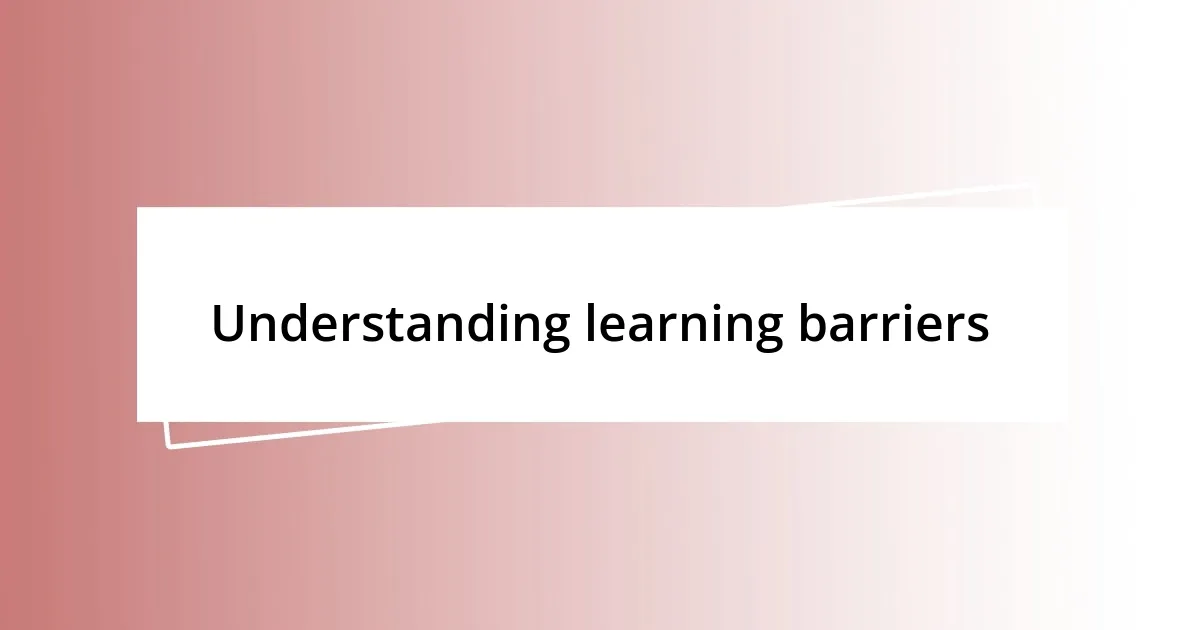
Understanding learning barriers
Understanding learning barriers requires recognizing that multiple factors can hinder our ability to absorb information. For instance, I remember struggling with math in high school, not because I lacked intelligence but due to my anxiety around tests. This experience made me question: How many students face similar challenges, feeling trapped by their circumstances?
In my view, emotional factors often play a significant role in learning barriers. I’ve encountered students who had brilliant ideas but hesitated to share them due to fear of judgment. This leads me to wonder, how much of our learning potential is compromised by our emotional state?
Physical and environmental factors shouldn’t be overlooked either. I once studied in a noisy cafeteria, and it was nearly impossible to focus. So, I ask you: haven’t we all had moments where our surroundings made learning feel like an uphill battle? These barriers can deeply affect our education, reminding us that understanding them is the first step toward overcoming them.
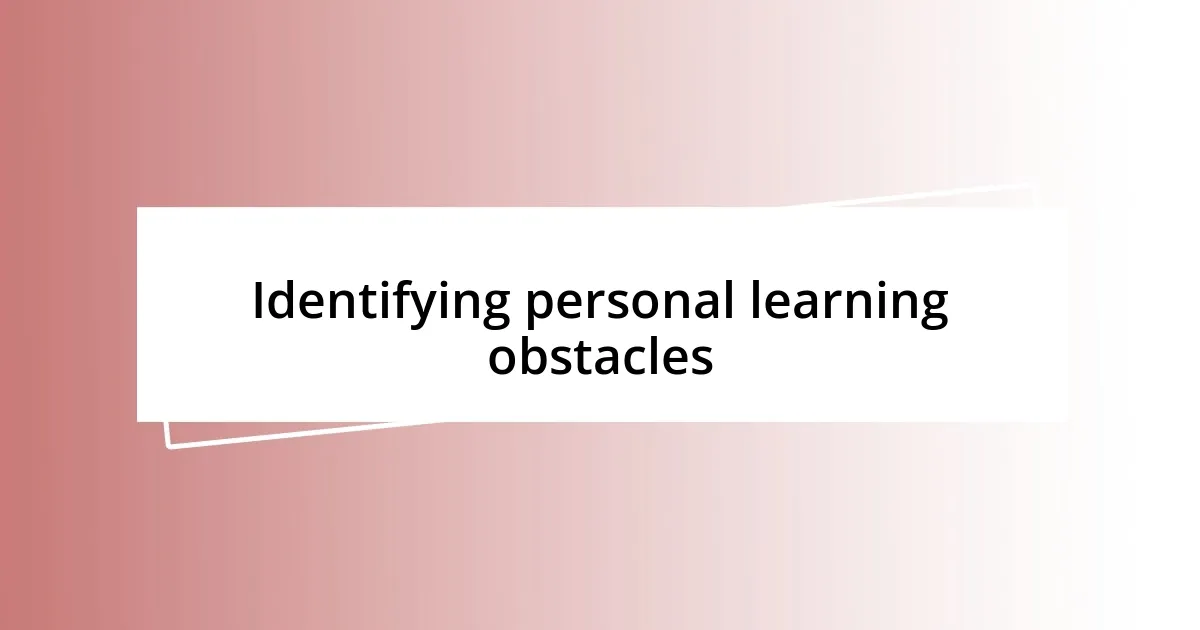
Identifying personal learning obstacles
Identifying personal learning obstacles starts with self-reflection. I distinctly remember a time when I struggled with procrastination, convinced I could catch up at the last minute. However, I soon realized that my habit of delaying tasks stemmed from a fear of not being perfect. It was through journaling that I uncovered this truth, and understanding my motivation helped to illuminate my learning barriers.
Sometimes, external feedback can be just as illuminating. I had a mentor once who observed that I often misunderstood instructions because I was too eager to contribute ideas instead of listening. This feedback opened my eyes to the fact that active listening was a significant obstacle for me. Now, I consciously remind myself to absorb what others are saying before jumping in.
Finally, environmental factors can complicate the learning process. I recall attending a workshop in a cluttered room, which distracted me from the presentation. This experience taught me how important it is to create a conducive learning environment. When you start to recognize these specific obstacles in your own life, you’re taking a crucial step toward enhancing your learning experience.
| Learning Obstacles | Examples |
|---|---|
| Emotional | Anxiety around presenting ideas |
| Cognitive | Procrastination due to perfectionism |
| Environmental | Distractions from a noisy setting |
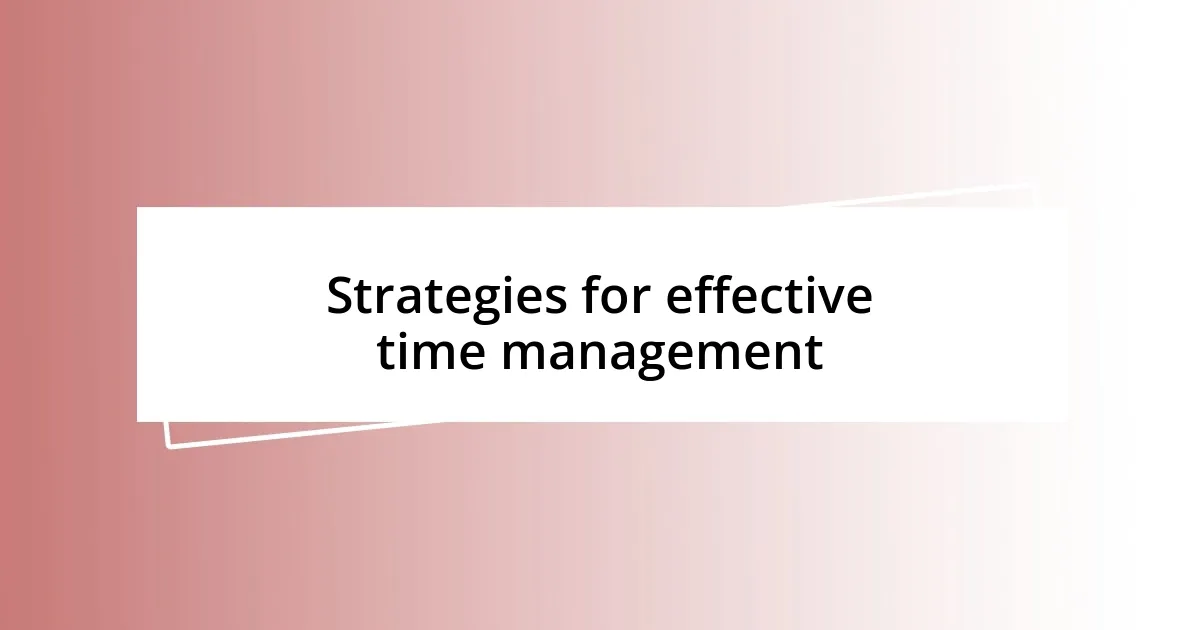
Strategies for effective time management
Effective time management is crucial in overcoming learning barriers. I’ve found that creating a daily schedule not only helps me focus but also reduces my anxiety. It’s like giving myself a roadmap for the day, which takes the stress out of unexpected tasks creeping up on me.
Here are some strategies that have worked well for me:
– Prioritize Tasks: I list tasks in order of urgency. I often tackle the hardest ones first when my energy is highest.
– Set Specific Goals: Breaking larger projects into manageable pieces has been a game changer. I can celebrate small wins, which keeps me motivated.
– Use Timers: I employ techniques like the Pomodoro Technique, working for timed intervals followed by a break. This keeps my mind fresh and focused.
– Limit Distractions: I turn off notifications on my phone and create a quiet study space. This has significantly improved my concentration.
– Reflect and Adjust: At the end of each week, I review what went well and what didn’t. This helps me refine my strategies constantly.
Time blocking is another effective strategy I’ve embraced. By allocating specific time slots for different activities, I minimize decision fatigue and maximize my productivity. For instance, I used to aimlessly scroll through social media during study sessions, but with clear time blocks, these distractions have diminished significantly.
Using a digital calendar or a traditional planner to map out my days has been invaluable. I can visualize my commitments, allowing me to balance study, work, and leisure effectively. This approach not only helps in managing time but also enhances my overall emotional well-being, as I feel more in control and less overwhelmed.
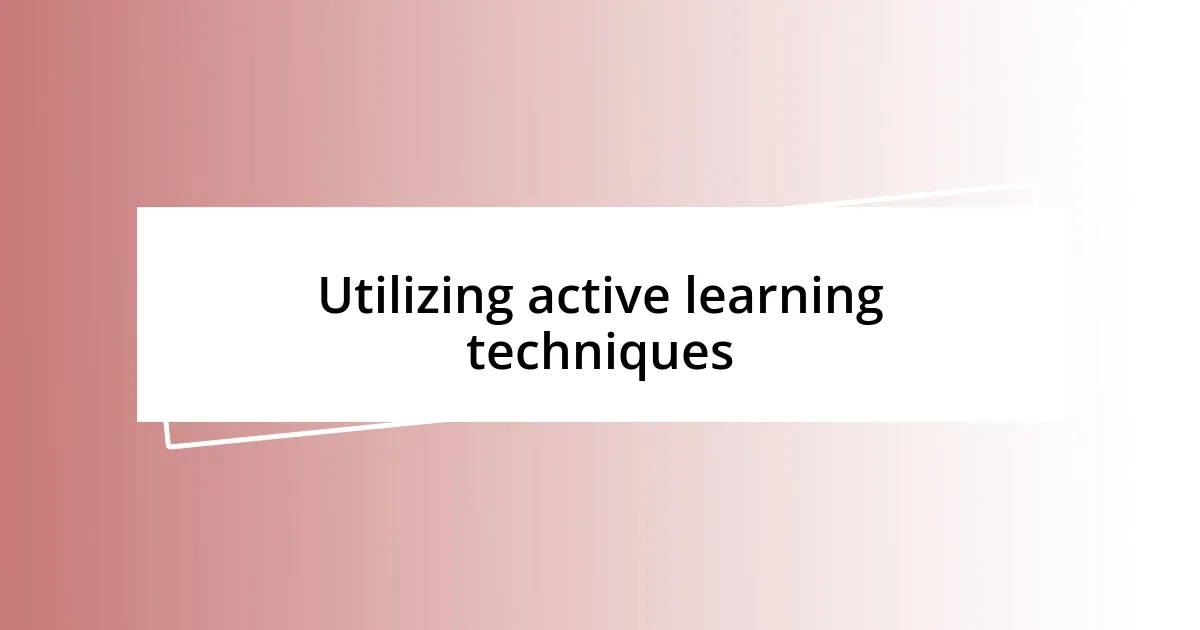
Utilizing active learning techniques
Utilizing active learning techniques has transformed the way I approach my studies. I remember attending a workshop where we were encouraged to engage in hands-on activities instead of passively absorbing information. The hands-on experience not only made the material unforgettable but also sparked genuine curiosity in me. Isn’t it fascinating how our brains are wired to retain information better when we actively participate?
One technique that has become a staple for me is collaborative learning. Over the years, I’ve participated in study groups where we would tackle complex topics together. The back-and-forth discussions often unearthed ideas I’d never considered. Sharing insights not only deepens understanding but also makes the learning process feel less isolating. Have you ever felt like you’ve learned more during a casual conversation than in a formal setting? That’s the power of dialogue in active learning.
Another powerful method I’ve embraced is the use of teaching as a learning tool. I vividly recall a moment when I had to explain a challenging concept to a friend. Preparing for that discussion forced me to break down complicated ideas into digestible parts. By teaching, I found clarity in my understanding. It made me realize that the best way to solidify knowledge is to share it. How many times have you felt a concept click after you’ve had to explain it to someone else?
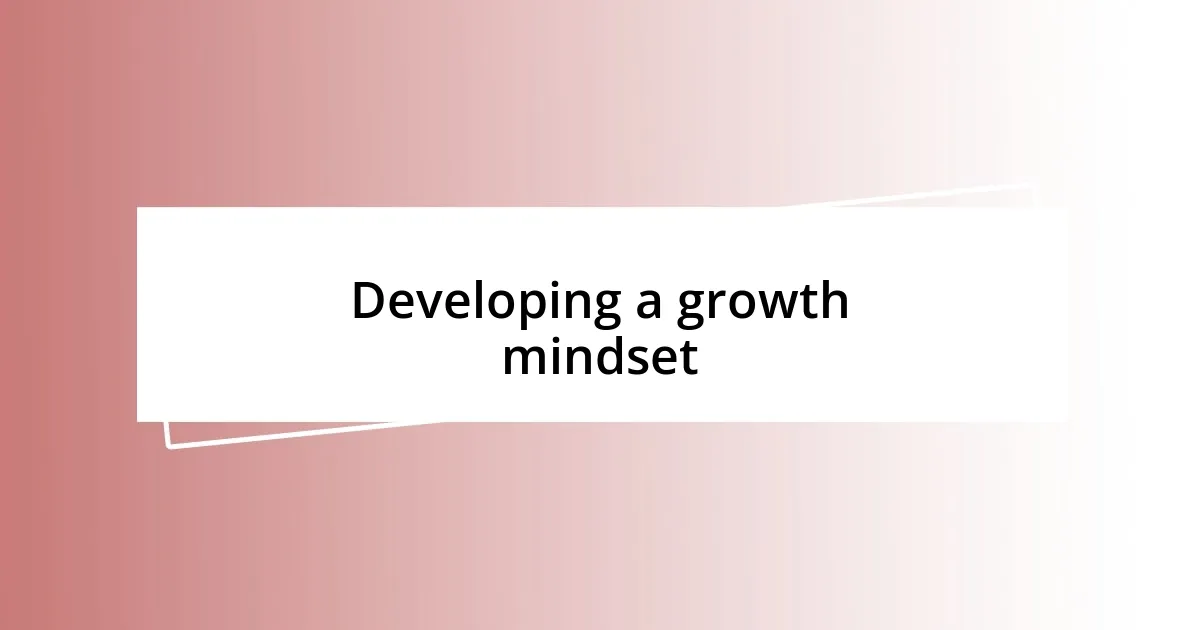
Developing a growth mindset
Developing a growth mindset has been a transformative experience for me. I recall a time when I faced a challenging math problem that left me feeling defeated. Instead of giving up, I began to see it as an opportunity to learn. By approaching those difficult moments with curiosity rather than frustration, I’ve found that my attitude has shifted significantly. How often do we let a single setback define our capabilities?
I’ve discovered that embracing challenges can lead to unexpected growth. Take my experience with public speaking, for instance. Initially, the thought of presenting in front of an audience terrified me. However, every time I pushed myself to face that fear, I emerged with not only better presentation skills but also a newfound confidence. It’s surprising how stepping out of our comfort zones can reveal strengths we never knew we had. Does that resonate with your own experiences of overcoming fears?
Creating a habit of self-reflection has played a pivotal role in nurturing my growth mindset. After each learning experience, I take a moment to jot down what I’ve learned and how I can improve. This practice of evaluating my progress reminds me that failure isn’t a permanent label but a stepping stone. It’s empowering to see mistakes as valuable lessons rather than setbacks. Have you tried reflecting on your learning journey? It might just change your perspective.
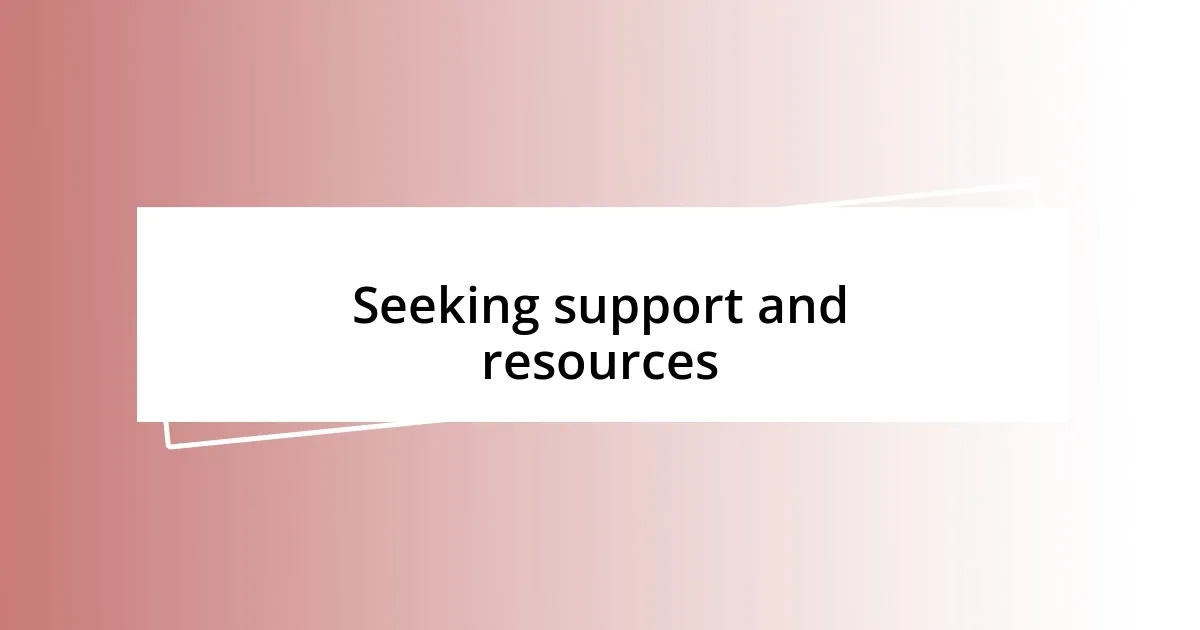
Seeking support and resources
Reaching out for support has been crucial in my journey to overcome learning barriers. I vividly remember a time when I was struggling with a particular subject, feeling completely lost. Rather than isolating myself, I decided to seek help from a mentor. That one conversation not only clarified my doubts but also opened doors to additional resources I never knew existed. Have you ever noticed how just one supportive connection can illuminate your path?
Utilizing online resources has also proven invaluable. I often find myself diving into educational platforms or forums to gather different perspectives on challenging topics. For instance, one night I was stuck on a complex coding issue and turned to an online community for guidance. The advice I received not only solved my problem but also fostered a sense of camaraderie. It’s remarkable how we can find support when we’re willing to explore the wealth of knowledge available at our fingertips.
Finally, I’ve learned that sharing my struggles can create a ripple effect of support. When I openly talked about my challenges in a study group, I was surprised to find others felt the same way. This mutual vulnerability led us to pool our resources and experiences, enhancing our learning collectively. It’s fascinating how embracing honesty can foster a supportive environment. Have you ever thought about how your openness might help someone else?
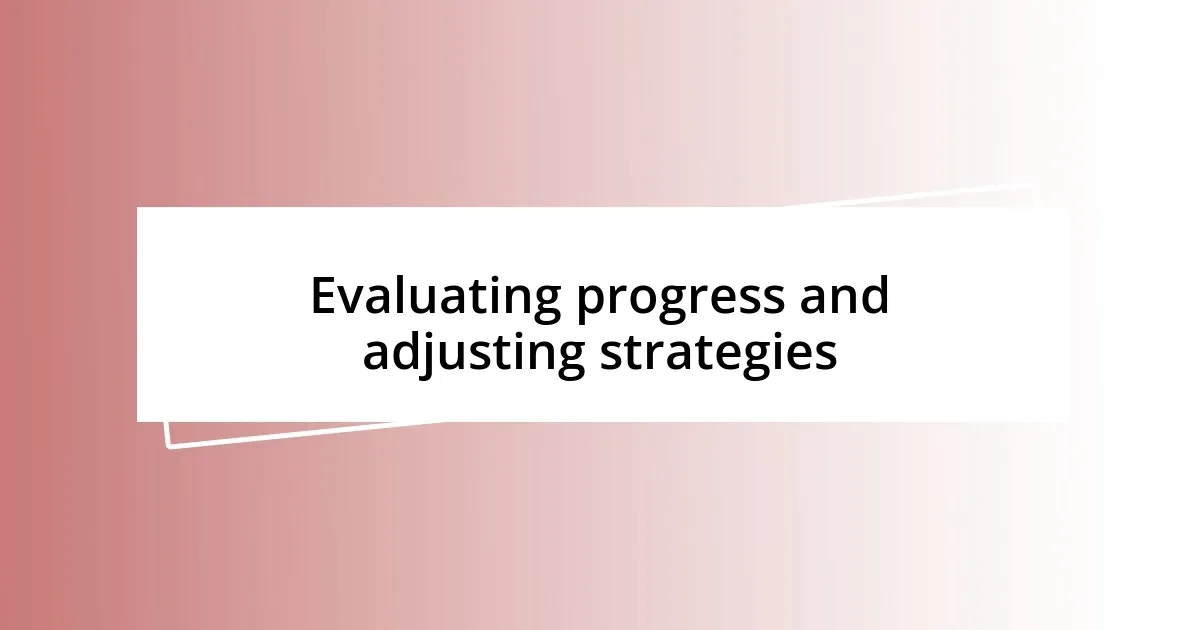
Evaluating progress and adjusting strategies
Evaluating progress is essential for me to understand what’s working and what isn’t. Each week, I set aside time to review my learning goals, assess my achievements, and identify areas that need tweaking. This self-assessment has often led me to pivot my strategies—for instance, when I realized a particular study method wasn’t yielding results, I sought alternatives like visual aids or study groups. Have you ever noticed how a small shift in approach can lead to significant breakthroughs?
Adjusting strategies based on feedback is a practice I’ve embraced wholeheartedly. After completing a project, I like to gather feedback from peers and mentors. The insights I gain often reveal blind spots I hadn’t considered. For example, after a recent presentation, constructive criticism prompted me to refine my delivery style, which ultimately enhanced my confidence and effectiveness. Isn’t it interesting how feedback can act as a compass, guiding us toward improvement?
I’ve also found that emotions play a pivotal role in my evaluation process. Reflecting on how I felt during specific learning experiences helps me gauge my engagement. I recall feeling drained after hours of solitary study and deciding to switch gears toward more interactive methods. It’s empowering to recognize that my emotional responses can inform my learning strategy. Have you ever considered how your feelings might influence your learning journey? Reflecting on this can lead to more tailored approaches that resonate with you personally.
